波场(Tron)发币教程
免手续费,易上手,直接发行和定制属于自己的波场链代币
什么是 TRC-20 代币
波场链上有两种同质化代币标准:TRC-10 和 TRC-20
TRC-10 代币是波场原生代币标准,不依赖智能合约,直接在链上发行。发行成本低,交易速度快,手续费低廉(仅消耗带宽和能量),功能简单,仅支持基础转账和余额查询。常用于简单资产发行(如社区代币、积分)等低复杂度应用场景。
TRC-20 代币类似以太坊的 ERC-20,基于智能合约的标准化代币。支持复杂功能(如授权转账、代币销毁等),交易需要消耗 TRX 作为手续费(Gas)。常用于 DeFi 代币(如稳定币、治理代币)等。
通常说到波场链的代币,未特殊说明的话,都是默认指 TRC-20 的代币标准。本文的发币教程也核心针对 TRC-20 代币标准进行演示说明。
标准 TRC-20 代币指的是没有任何功能、机制的代币合约,代币创建之后默认会丢弃权限,所以也没有任何权限,是一个纯粹的、干净的、标准的合约。
根据以下步骤,您可以在 Tron 上创建一个属于自己的标准合约代币。
部署准备
钱包:TronLink,保证钱包中至少有 150 个 TRX,用于支付代币部署的 gas 费用
部署平台:https://tronscan.org/#/contracts/contract-compiler
合约代码:https://github.com/cpbox/cpbox-token-contracts/blob/main/tron/trc20.sol
去到 cpbox 的 github 合约代码页面,点击下载,将合约代码下载到本地(trc20.sol),后面会用到这个文件
/**
* @dev Interface of the ERC20 standard as defined in the EIP.
*/
interface IERC20 {
/**
* @dev Emitted when `value` tokens are moved from one account (`from`) to
* another (`to`).
*
* Note that `value` may be zero.
*/
event Transfer(address indexed from, address indexed to, uint256 value);
/**
* @dev Emitted when the allowance of a `spender` for an `owner` is set by
* a call to {approve}. `value` is the new allowance.
*/
event Approval(
address indexed owner,
address indexed spender,
uint256 value
);
/**
* @dev Returns the amount of tokens in existence.
*/
function totalSupply() external view returns (uint256);
/**
* @dev Returns the amount of tokens owned by `account`.
*/
function balanceOf(address account) external view returns (uint256);
/**
* @dev Moves `amount` tokens from the caller's account to `to`.
*
* Returns a boolean value indicating whether the operation succeeded.
*
* Emits a {Transfer} event.
*/
function transfer(address to, uint256 amount) external returns (bool);
/**
* @dev Returns the remaining number of tokens that `spender` will be
* allowed to spend on behalf of `owner` through {transferFrom}. This is
* zero by default.
*
* This value changes when {approve} or {transferFrom} are called.
*/
function allowance(
address owner,
address spender
) external view returns (uint256);
/**
* @dev Sets `amount` as the allowance of `spender` over the caller's tokens.
*
* Returns a boolean value indicating whether the operation succeeded.
*
* IMPORTANT: Beware that changing an allowance with this method brings the risk
* that someone may use both the old and the new allowance by unfortunate
* transaction ordering. One possible solution to mitigate this race
* condition is to first reduce the spender's allowance to 0 and set the
* desired value afterwards:
* https://github.com/ethereum/EIPs/issues/20#issuecomment-263524729
*
* Emits an {Approval} event.
*/
function approve(address spender, uint256 amount) external returns (bool);
/**
* @dev Moves `amount` tokens from `from` to `to` using the
* allowance mechanism. `amount` is then deducted from the caller's
* allowance.
*
* Returns a boolean value indicating whether the operation succeeded.
*
* Emits a {Transfer} event.
*/
function transferFrom(
address from,
address to,
uint256 amount
) external returns (bool);
}
/**
* @dev Interface for the optional metadata functions from the ERC20 standard.
*
* _Available since v4.1._
*/
interface IERC20Metadata is IERC20 {
/**
* @dev Returns the name of the token.
*/
function name() external view returns (string memory);
/**
* @dev Returns the symbol of the token.
*/
function symbol() external view returns (string memory);
/**
* @dev Returns the decimals places of the token.
*/
function decimals() external view returns (uint8);
}
/**
* @dev Provides information about the current execution context, including the
* sender of the transaction and its data. While these are generally available
* via msg.sender and msg.data, they should not be accessed in such a direct
* manner, since when dealing with meta-transactions the account sending and
* paying for execution may not be the actual sender (as far as an application
* is concerned).
*
* This contract is only required for intermediate, library-like contracts.
*/
abstract contract Context {
function _msgSender() internal view virtual returns (address) {
return msg.sender;
}
function _msgData() internal view virtual returns (bytes calldata) {
return msg.data;
}
}
contract CpboxTRC20Token is Context, IERC20, IERC20Metadata {
mapping(address => uint256) private _balances;
mapping(address => mapping(address => uint256)) private _allowances;
string private _name;
string private _symbol;
uint8 private _decimals;
uint256 private _totalSupply;
address receiveAddress = msg.sender;
event Received(address Sender, uint Value);
constructor(
string memory tokenName,
string memory tokenSymbol,
uint8 tokenDecimals,
uint256 tokenSupply
) {
_name = tokenName;
_symbol = tokenSymbol;
_decimals = tokenDecimals;
uint256 initSupply = tokenSupply * 10 ** _decimals;
_mint(receiveAddress, initSupply);
}
/**
* @dev Returns the name of the token.
*/
function name() public view virtual override returns (string memory) {
return _name;
}
/**
* @dev Returns the symbol of the token, usually a shorter version of the
* name.
*/
function symbol() public view virtual override returns (string memory) {
return _symbol;
}
/**
* @dev Returns the number of decimals used to get its user representation.
* For example, if `decimals` equals `2`, a balance of `505` tokens should
* be displayed to a user as `5.05` (`505 / 10 ** 2`).
*
* Tokens usually opt for a value of 18, imitating the relationship between
* Ether and Wei. This is the value {ERC20} uses, unless this function is
* overridden;
*
* NOTE: This information is only used for _display_ purposes: it in
* no way affects any of the arithmetic of the contract, including
* {IERC20-balanceOf} and {IERC20-transfer}.
*/
function decimals() public view virtual override returns (uint8) {
return _decimals;
}
/**
* @dev See {IERC20-totalSupply}.
*/
function totalSupply() public view virtual override returns (uint256) {
return _totalSupply;
}
/**
* @dev See {IERC20-balanceOf}.
*/
function balanceOf(
address account
) public view virtual override returns (uint256) {
return _balances[account];
}
/**
* @dev See {IERC20-transfer}.
*
* Requirements:
*
* - `to` cannot be the zero address.
* - the caller must have a balance of at least `amount`.
*/
function transfer(
address to,
uint256 amount
) public virtual override returns (bool) {
address owner = _msgSender();
_transfer(owner, to, amount);
return true;
}
/**
* @dev See {IERC20-allowance}.
*/
function allowance(
address owner,
address spender
) public view virtual override returns (uint256) {
return _allowances[owner][spender];
}
/**
* @dev See {IERC20-approve}.
*
* NOTE: If `amount` is the maximum `uint256`, the allowance is not updated on
* `transferFrom`. This is semantically equivalent to an infinite approval.
*
* Requirements:
*
* - `spender` cannot be the zero address.
*/
function approve(
address spender,
uint256 amount
) public virtual override returns (bool) {
address owner = _msgSender();
_approve(owner, spender, amount);
return true;
}
/**
* @dev See {IERC20-transferFrom}.
*
* Emits an {Approval} event indicating the updated allowance. This is not
* required by the EIP. See the note at the beginning of {ERC20}.
*
* NOTE: Does not update the allowance if the current allowance
* is the maximum `uint256`.
*
* Requirements:
*
* - `from` and `to` cannot be the zero address.
* - `from` must have a balance of at least `amount`.
* - the caller must have allowance for ``from``'s tokens of at least
* `amount`.
*/
function transferFrom(
address from,
address to,
uint256 amount
) public virtual override returns (bool) {
address spender = _msgSender();
_spendAllowance(from, spender, amount);
_transfer(from, to, amount);
return true;
}
/**
* @dev Atomically increases the allowance granted to `spender` by the caller.
*
* This is an alternative to {approve} that can be used as a mitigation for
* problems described in {IERC20-approve}.
*
* Emits an {Approval} event indicating the updated allowance.
*
* Requirements:
*
* - `spender` cannot be the zero address.
*/
function increaseAllowance(
address spender,
uint256 addedValue
) public virtual returns (bool) {
address owner = _msgSender();
_approve(owner, spender, allowance(owner, spender) + addedValue);
return true;
}
/**
* @dev Atomically decreases the allowance granted to `spender` by the caller.
*
* This is an alternative to {approve} that can be used as a mitigation for
* problems described in {IERC20-approve}.
*
* Emits an {Approval} event indicating the updated allowance.
*
* Requirements:
*
* - `spender` cannot be the zero address.
* - `spender` must have allowance for the caller of at least
* `subtractedValue`.
*/
function decreaseAllowance(
address spender,
uint256 subtractedValue
) public virtual returns (bool) {
address owner = _msgSender();
uint256 currentAllowance = allowance(owner, spender);
require(
currentAllowance >= subtractedValue,
"ERC20: decreased allowance below zero"
);
unchecked {
_approve(owner, spender, currentAllowance - subtractedValue);
}
return true;
}
/**
* @dev Moves `amount` of tokens from `from` to `to`.
*
* This internal function is equivalent to {transfer}, and can be used to
* e.g. implement automatic token fees, slashing mechanisms, etc.
*
* Emits a {Transfer} event.
*
* Requirements:
*
* - `from` cannot be the zero address.
* - `to` cannot be the zero address.
* - `from` must have a balance of at least `amount`.
*/
function _transfer(
address from,
address to,
uint256 amount
) internal virtual {
require(from != address(0), "ERC20: transfer from the zero address");
require(to != address(0), "ERC20: transfer to the zero address");
uint256 fromBalance = _balances[from];
require(
fromBalance >= amount,
"ERC20: transfer amount exceeds balance"
);
unchecked {
_balances[from] = fromBalance - amount;
// Overflow not possible: the sum of all balances is capped by totalSupply, and the sum is preserved by
// decrementing then incrementing.
_balances[to] += amount;
}
emit Transfer(from, to, amount);
}
/** @dev Creates `amount` tokens and assigns them to `account`, increasing
* the total supply.
*
* Emits a {Transfer} event with `from` set to the zero address.
*
* Requirements:
*
* - `account` cannot be the zero address.
*/
function _mint(address account, uint256 amount) internal virtual {
require(account != address(0), "ERC20: mint to the zero address");
_totalSupply += amount;
unchecked {
// Overflow not possible: balance + amount is at most totalSupply + amount, which is checked above.
_balances[account] += amount;
}
emit Transfer(address(0), account, amount);
}
function _approve(
address owner,
address spender,
uint256 amount
) internal virtual {
require(owner != address(0), "ERC20: approve from the zero address");
require(spender != address(0), "ERC20: approve to the zero address");
_allowances[owner][spender] = amount;
emit Approval(owner, spender, amount);
}
/**
* @dev Updates `owner` s allowance for `spender` based on spent `amount`.
*
* Does not update the allowance amount in case of infinite allowance.
* Revert if not enough allowance is available.
*
* Might emit an {Approval} event.
*/
function _spendAllowance(
address owner,
address spender,
uint256 amount
) internal virtual {
uint256 currentAllowance = allowance(owner, spender);
if (currentAllowance != type(uint256).max) {
require(
currentAllowance >= amount,
"ERC20: insufficient allowance"
);
unchecked {
_approve(owner, spender, currentAllowance - amount);
}
}
}
}
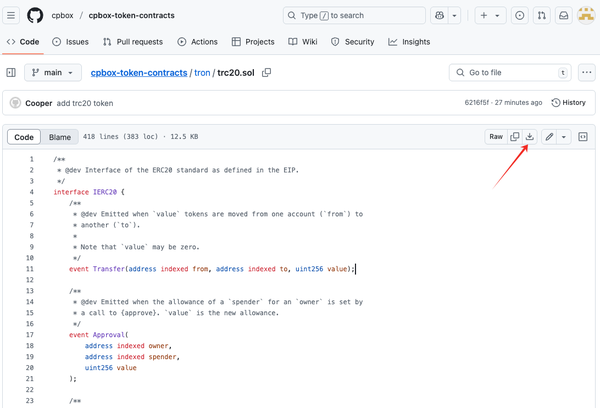
部署流程
打开合约部署的页面:https://tronscan.org/#/contracts/contract-compiler,点击页面右上角进行钱包连接
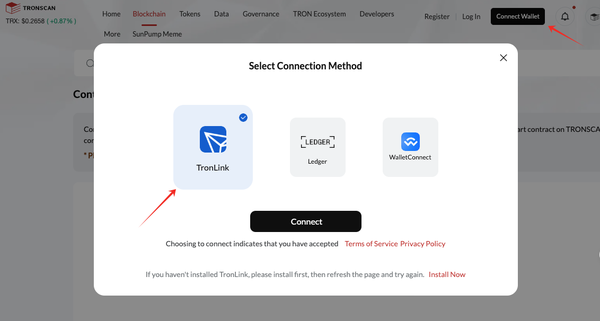
点击上传按钮,将前面从 github 下载的合约代码(trc20.sol)进行上传
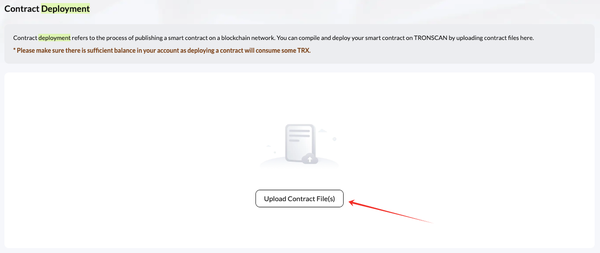
合约上传成功之后即可在页面中看到合约的代码
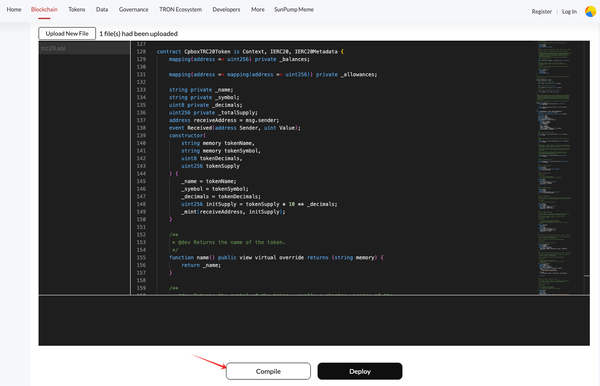
点击编译按钮
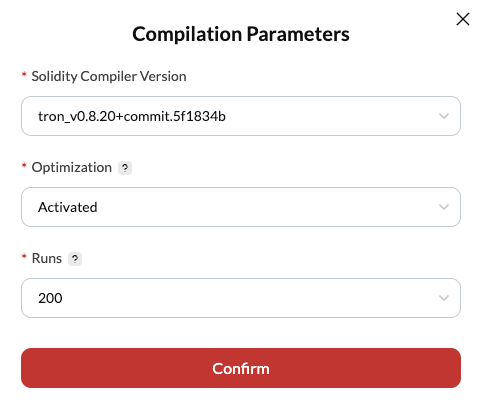
这里我们启用优化配置,可以帮助我们部署的时候更节省 gas,然后点击 Confirm 进行确认 如果看到下面这几行绿色的信息,即表示合约代码编译通过,准备开始部署

下面开始点击部署,开始相关代币参数的配置
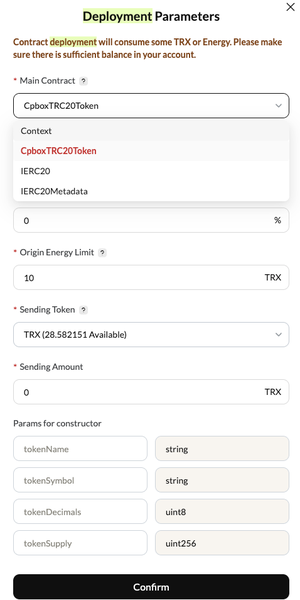
首先要么要选择 CpboxTRC20Token 这个合约,选择之后可以看到最下面的代币信息填写区域: tokenName:代币的名称
tokenSymbol:代币的符号
tokenDecimals:代币的小数点
tokenSupply:代币的供应量,假设我们总共的代币供应量为 10000,decimal 为 18 位,那么这里的 initialSupply 的供应量就需要填 10000000000000000000000 = 10000 * 10^18(10000 乘以 10 的 18 次方)
以下是一份供应量为 10000 个 CDT 代币的示例配置:
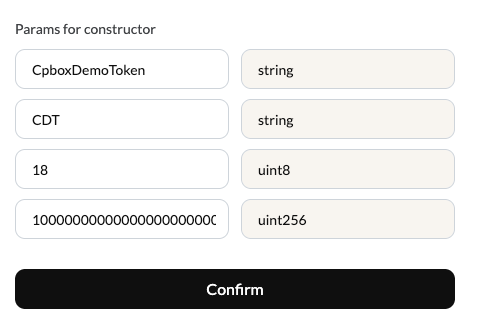
点击 Confirm 进行确认,即可唤起 TronLink 钱包,将合约部署的交易发到链上(注意要保证有充足的 TRX 进行 gas 费用的支付)
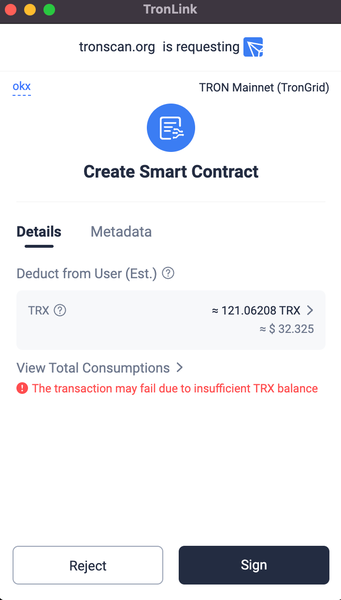
交易确认成功之后即代币部署成功。
上面介绍了波场链(Tron)上部署代币的方式,如果你觉得太麻烦也可以选择 CPBOX 发币,支持多个主网
文档信息
版权声明:可自由转载(请注明转载出处)-非商用-非衍生
发表时间:2025年6月17日 17:18